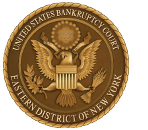(After You File)
|
|
Open all mail or email sent to you by the Court. If you are missing required documents, or if there is a hearing scheduled in your case, it is presumed that you received notices that are sent by mail or email to the addresses provided. You will also receive any undeliverable notices that were sent to your creditors. You must resend them and notify the Court of the correct address using this form. Click here for how to file papers with the court. Have you moved? If you have moved or if for some other reason, the court does not have your correct address, it is your responsibility to notify the court with your correct address by completing this form and filing it with the court. Click here for how to file papers with the court. |
After filing your paperwork with the court, you must:
(1) Send documents to the trustee;
(2) Be examined by the trustee; and
(3) Complete the debtor education.
Trustee’s Meeting of Creditors:
Section 341 of the Bankruptcy Code requires debtors to be examined by the trustee under oath. This meeting takes place on the ZOOM platform about 30 days after filing.
PRIOR TO THE MEETING:
You must provide the Trustee (NOT THE COURT), with copies of the items listed below. Contact your trustee to obtain the secure portal information to send these items. Trustee contact information can be found here.
- Current government issued photo I.D.;
- Social security card;
- Most recent Federal Tax Return OR a notarized statement indicating why you were not required to file a tax return.
ZOOM INFORMATION:
Instructions and the ZOOM I.D. and Passcode will be sent to you by mail at least 1 week prior to your meeting date and is also located on your case docket. You may contact the Pro Se Clerk or the trustee assigned to your case for more information.
Debtors may request an interpreter if they are not comfortable being examined in English. Services are also available for debtors who have hearing impairment or a communication disorder.
Mandatory Debtor Education:
In order to receive a discharge, individual debtors must obtain debtor education and file a certificate of completion. This is different than the first certificate, but you may use the same agency that you used for the first one. When completed, the agency will either directly file the Certificate of Debtor Education with the Court, or, it will be sent to you to file. Click here for list of approved debtor education providers.
Amending Schedules:
You may amend schedules and documents that you already filed. You must print out a blank version of the form you need to make changes to, complete it with the correct information, and check the box at the top that indicates it is an amended form. Fees may apply. Local Rules may also require you to serve parties for some amendments to make the amendments valid.
Note to Chapter 13 Debtors:
It is strongly advised that an individual obtain legal advice from a qualified attorney when considering Chapter 13. The ongoing and additional obligations of a Chapter 13 debtor make Chapter 13 cases more complex than Chapter 7 bankruptcies. Chapter 13 debtors are required to provide the trustee additional documents called Mandatory Disclosures to prevent dismissal of the case. Debtors must also file a repayment plan within 14 days of filing if it is not filed with the petition. Payments under the plan are paid to the trustee usually on a monthly basis, and must pay the required amounts toward all priority, secured, and filed unsecured claims, or the case may be dismissed. Post-petition payments to secured creditors (e.g., mortgages and car loans) must remain current after you file in order to keep the property. Learn More >>>
More Information for Debtors:

